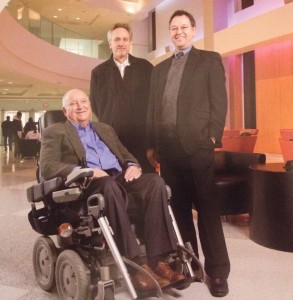Michael Graves, left, with fellow Alter Hall architects Tom Rowe, center, and Michael Crackel.
Michael Graves, the postmodern architect whose work includes Alter Hall, the home of Temple University’s Fox School of Business, died March 12. He was 80.
Michael Graves & Associates Architecture & Design, Graves’ architectural firm based in Princeton, N.J., designed Alter Hall with assistance of local architects Burt Hill Kosar Rittelmann Associates. Dedicated in 2009, the eight-floor, state-of-the-art building is one of the most-sophisticated business school facilities in the nation.
Graves’ team designed Fox School’s home to foster collaboration and connectivity among students and faculty, with soaring common areas, open staircases and ample meeting space. Alter Hall features a 4,200-square-foot student lounge, a 274-seat sloped auditorium, and a three-story atrium.
“Alter Hall was designed to be as dynamic and vibrant as our school community, and Michael Graves and his team were at the forefront of that design,” said Fox School Dean M. Moshe Porat. “Michael’s creativity and innovation rendered an indelible impression on our campus. It was with great regret to learn of Michael’s passing, and our thoughts at this time are with his family, friends and colleagues.”
 Graves’ architectural designs, which employed a menagerie of colors, symbolism and shapes, first took hold in the 1980s. His work, which inspired a generation of architects and popularized a form of design that’s still being used today, includes: the Swan and Dolphin Resort at Walt Disney World; the Philadelphia Eagles’ NovaCare Complex practice facility; and the U.S. Parks Service’s Washington Monument Restoration.
Graves’ architectural designs, which employed a menagerie of colors, symbolism and shapes, first took hold in the 1980s. His work, which inspired a generation of architects and popularized a form of design that’s still being used today, includes: the Swan and Dolphin Resort at Walt Disney World; the Philadelphia Eagles’ NovaCare Complex practice facility; and the U.S. Parks Service’s Washington Monument Restoration.
More than an architect, Graves also was an interior designer and product designer. He’s perhaps most-famously known for his collaboration with Target, for which he helped design the retailer’s “cheap chic” reputation with decorative-yet-affordable housewares and home goods.
Graves also served as a professor of architecture for 39 years at Princeton University. According to multiple published reports, he died of natural causes.
 “Of all his accomplishments, Michael often said that, like his own family, his proudest creation was his firm,” the firm said in a statement. “As we go forward in our practice, we will continue to honor Michael’s humanistic design philosophy through our commitment to creative unique design solutions that transform people’s lives.”
“Of all his accomplishments, Michael often said that, like his own family, his proudest creation was his firm,” the firm said in a statement. “As we go forward in our practice, we will continue to honor Michael’s humanistic design philosophy through our commitment to creative unique design solutions that transform people’s lives.”

